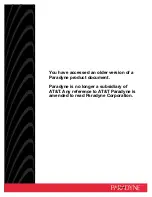
43
3-1-3. Time Configuration
The switch provides manual and automatic ways to set the system time via NTP.
Manual setting is simple and you just input “Year”, “Month”, “Day”, “Hour”, “Minute” and
“Second” within the valid value range indicated in each item. If you input an invalid value,
for example, 61 in minute, the switch will clamp the figure to 59.
NTP is a well-known protocol used to synchronize the clock of the switch system
time over a network. NTP, an internet draft standard formalized in RFC 1305, has been
adopted on the system is version 3 protocol. The switch provides four built-in NTP server
IP addresses resided in the Internet and an user-defined NTP server IP address. The time
zone is Greenwich-centered which uses the expression form of GMT+/- xx hours.
Function name:
Time
Function description:
Set the system time by manual input or set it by syncing from Time servers. The
function also supports daylight saving for different area’s time adjustment.
Parameter description:
Current Time:
Show the current time of the system.
Manual:
This is the function to adjust the time manually. Filling the valid figures in the
fields of Year, Month, Day, Hour, Minute and Second respectively and press
<Apply>
button, time is adjusted. The valid figures for the parameter Year,
Month, Day, Hour, Minute and Second are >=2000, 1-12, 1-31, 0-23, 0-59 and
0-59 respectively. Input the wrong figure and press
<Apply>
button, the device
will reject the time adjustment request. There is no time zone setting in Manual
mode.
Default: Year = 2000, Month = 1, Day = 1
Hour = 0,
Minute = 0,
Second = 0
Summary of Contents for L2 Plus
Page 1: ......
Page 2: ......
Page 3: ...16 Port SFP 8 Port Combo GbE L2 Plus Managed Switch...
Page 4: ...2...
Page 36: ...34 Fig 2 15 Office Network Connection Fig 2 14 Peer to peer Network Connection...
Page 56: ......
Page 78: ...22 Fig 3 24...
Page 81: ...25 Fig 3 26...
Page 88: ...32 Fig 3 31...
Page 96: ...40 Fig 3 39 Fig 3 40 Fig 3 41...
Page 112: ...56 Fig 3 62 Set up VLAN Tag Priority Mapping Finish...
Page 119: ...63 Fig 3 67 Ingress Port Fig 3 68...
Page 121: ...65 Fig 3 70...
Page 122: ...66 Fig 3 71 Fig 3 72 Fig 3 73 ARP...
Page 123: ...67 Fig 3 74 ARP Fig 3 75 ARP Fig 3 76 ARP Fig 3 77 ARP...
Page 124: ...68 Fig 3 78 ARP Fig 3 79 ARP Fig 3 80 ARP Fig 3 81 ARP...
Page 125: ...69 Fig 3 82 ARP Fig 3 83 ARP Fig 3 84 ARP Fig 3 85 ARP Fig 3 86 ARP...
Page 126: ...70 Fig 3 87 IPv4 Fig 3 88 IPv4 Fig 3 89 IPv4...
Page 127: ...71 Fig 3 90 IPv4 Fig 3 91 IPv4 Fig 3 92 IPv4 Fig 3 93 IPv4 Fig 3 94 IPv4...
Page 128: ...72 Fig 3 95 IPv4 Fig 3 96 IPv4 Fig 3 97 IPv4 Fig 3 98 IPv4 Fig 3 99 IPv4...
Page 129: ...73 Fig 3 100 IPv4 Fig 3 101 IPv4 Fig 3 102 IPv4...
Page 130: ...74 Fig 3 103 IPv4 Fig 3 104 IPv4 Fig 3 105 IPv4...
Page 131: ...75 Fig 3 106 IPv4 Fig 3 107 IPv4 Fig 3 108 IPv4...
Page 132: ...76 Fig 3 109 IPv4 Fig 3 110 IPv4 Fig 3 111 IPv4...
Page 133: ...77 Fig 3 112 IPv4 Fig 3 113 IPv4 Fig 3 114 IPv4...
Page 134: ...78 Fig 3 115 IPv4 Fig 3 116 IPv4 Fig 3 117 Action...
Page 135: ...79 Fig 3 118 Rate Limiter Fig 3 119 Port Copy...
Page 136: ...80 Fig 3 120 DMAC Filter Fig 3 121 VLAN ID Filter Fig 3 122 VLAN ID Filter...
Page 148: ...92 Fig 3 125 Set up Policy Rules Fig 3 126 Set up Policy Rules Fig 3 127 Set up Policy Rules...
Page 150: ...94 Fig 3 131 Set up Port Policies Fig 3 132 Set up Port Policies Finish...
Page 164: ...108 Fig 3 143 802 1X Server Configuration...
Page 168: ...112 Fig 3 145 802 1X Status...
Page 194: ...138 Fig 3 161 Mirror Configuration...
Page 214: ...158 Fig 4 1 Fig 4 2 LGB1005A R2 LGB1005A R2 LGB1005A R2 LGB1005A R2...
















































